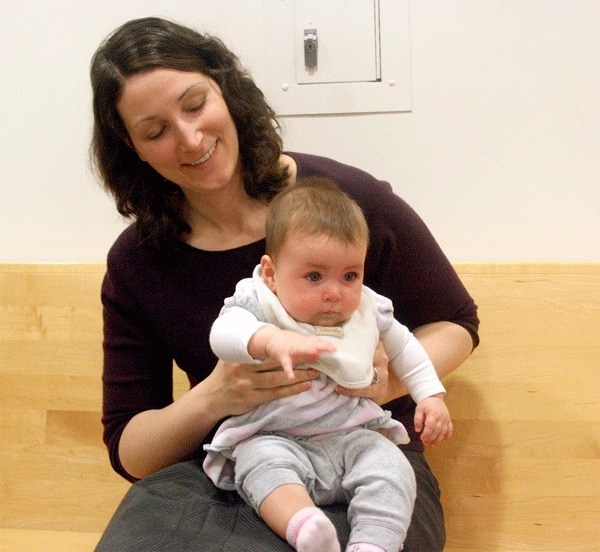A jury in Island County Superior Court found 22-year-old Oak Harbor resident Jordyn Weichert guilty of three counts of vehicular homicide and two counts of vehicular assault after brief deliberations Tuesday morning.
The jurors, however, found that Weichert was guilty of the least-serious category or “prong” of the charges, which is defined as “disregard for the safety of others.”
Weichert and her former co-defendent, 22-year-old Samantha Bowling, will be sentenced during a special session, likely at the end of the month. Bowling, the front-seat passenger, pleaded guilty last week to three counts of vehicular homicide for her part in the accident.
Reaction to the verdict was muted in the courtroom. British Columbia resident Erin Wood testified at the trial and arrived with her infant daughter, Sierra, to hear the verdict. Her husband, the wife of 33-year-old Brian Wood, was killed in the Sept. 3 accident and she was seriously injured; she was seven-months pregnant at the time. She testified that she woke from a nap just before the collision and only has fractured, dream-like memories of the event.
Also killed in the accident on North Whidbey were 25-year-old Jacob Quistorf and 26-year-old Francis Malloy, both of Oak Harbor. Bowling suffered a fractured hip.
Testimony in the trial ended abruptly Monday morning when the prosecution rested and the defense announced it would also rest without presenting any witnesses.
In a victory for the defense, Island County Superior Court Judge Alan Hancock ruled that there was “virtually no evidence” that Weichert, the driver, was impaired by drug use.
Hancock’s decision meant that the jury wasn’t allowed to consider whether Weichert was guilty of the “driving under the influence” category of vehicular homicide and vehicular assault, which is the most serious and carries the greatest potential sentence under the three “prongs” of the charges.
While state toxicologist Lisa Noble testified that Weichert’s blood tested positive for methamphetamine and morphine — which could be a metabolite of heroin — Noble could only speculate that it was possible the level of drugs found in Weichert’s system would have impaired the young woman’s ability to drive.
The prosecution was unable to present evidence of “bad driving” independent of the wild swerving witnesses associated with Weichert’s decision to make a clothing change and relinquish control of the steering wheel just before the collision, the judge ruled.
“If a toxicology expert cannot determine if she was impaired at the time of the accident, then how can a jury?” Hancock asked rhetorically.
Still, the jurors were left to consider two other prongs of vehicular assault and vehicular homicide. They are defined as driving in a “reckless manner,” or the least serious version, driving with “disregard for the safety of others.” Hancock ruled that the prosecutor could argue that Weichert’s decision to take drugs and drive could be considered reckless.
In closing argument, Deputy Prosecutor David Carman and defense attorney Diego Vargas offered the jury their differing interpretations of the evidence, though they agreed on some central details of the astonishingly violent accident.
Weichert was driving Bowling’s 1994 Chevrolet Blazer northbound on Highway 20 on the night of Sept. 3. Bowling was in the front passenger seat while Malloy and Quistorf were in back. Weichert decided to either put on or take off a sweater. Bowling held the steering wheel. The Blazer started to drift and both women grabbed the steering wheel. The Blazer was out of control when it crossed the centerline and struck a southbound Subaru driven by Brian Wood.
Detective Craig Cardinal with the Washington State Patrol testified about the sheer violence of the accident. The Blazer, he said, was so out of control that it actually rolled over the top of the Subaru. They were “roof-to-roof,” he said, when Wood was crushed. The Blazer then rolled or bounced up the highway.
Malloy was ejected from the Blazer and it rolled over him. Quistorf suffered traumatic head injuries inside the Blazer. Bowling was thrown from the vehicle and broke her hip. Weichert was thrown and sustained minor injuries.
Carman argued that Weichert acted recklessly by getting behind the wheel after taking drugs. He also said she was reckless for relinquishing the steering wheel and then not taking control back after finishing her sweater change. Carman said a long series of decisions by Weichert led to the terrible outcome.
“What happened was a crime. What happened was reckless,” he said. “What happened was Jordyn Weichert’s fault.”
On the other side, Vargas argued that the accident was caused by “simple negligence,” which is not a criminal act under state law. He pointed out that several jurors during jury selection admitted to changing clothes during driving or taking their hands off the wheel. That’s not criminal, he said, that’s just simple negligence.
“That’s the kind of thing that can happen to anyone,” he said of the collision. “That’s a ‘but-by-the-grace-of-God’ kind of situation.”
Vargas also emphasized that the judge had ruled the prosecution didn’t present convincing evidence of impairment. He said the prosecutor focused in closing arguments on the drug issue to prejudice Weichert. He said the drug evidence wasn’t relevant to the accident, but that Carman used it to persuade the jury to dislike Weichert.
“Mr. Carman got up here and said drugs, drugs, drugs, drugs,” Vargas said. “He must have said it 25 times.”
Vargas insisted the drugs played no role in the cause of the tragedy.
“Without the drugs, you have two young girls who did something negligent and horrible things happened,” he said.
Weichert is facing from six years and five months to eight and a half years and six months in prison under the standard sentencing range. Under the terms of Bowling’s plea agreement, the prosecution and defense will recommend a sentence of five years and one month in prison.



